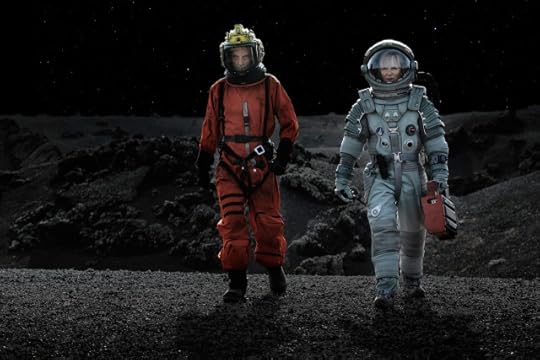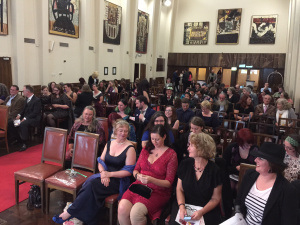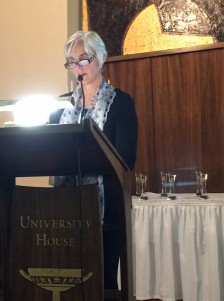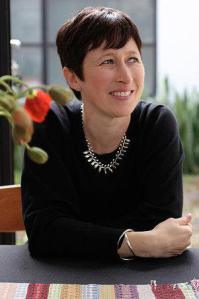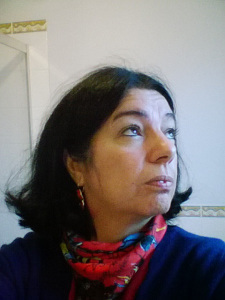Maureen Flynn's Blog, page 12
May 15, 2015
Maureen’s 50 in 50 List
Years ago I wrote a letter to myself to be opened when I was 21 which also contained a list of things I wanted to do in my life. Since then, I’ve gotten a much better idea of who I want to be and where I’m heading so I thought it was time to re-visit the list. At the same time, Kate Forsyth posed her own 50 in 50 list which inspired me to buck up and put mine somewhere. Hers is pretty damn awesome! You can check it out here.
What’s a 50 in 50 list?
A list of things I want to do or achieve by the time I hit the youthful age of 50! I have tried to divide mine by type of thing. Let’s just say I’ll be busy for awhile!
Maureen’s List:
Writing:

1. Finish a full length novel manuscript
2. Do a script-writing course at NIDA
3. Submit a script to the BBC Writers Room
4. Get a drama commissioned by the ABC or BBC
5. Write a Doctor Who audio for Big Finish
6. Write an episode of TV Doctor Who
7. Publish novels through a mainstream publisher
8. Do a Writers Residency overseas
9. Do a Writers Residency in Australia
10. Collaborate on a writing project with another author
11. Sell 10 000 books
Careers:
12. Run my own kick-ass NGO
13. Work for Community Catalyst UK
14. Work inside Westminster
15. Make my own inclusive tour company all about pop culture themes
Cons/Festivals:
16. Go to the Agatha Christie Festival in the UK
17. Go to the UK CrimeFest
18. Go to World Fantasy Con at least once
19. Go to San Diego Comic Con
Travel:

20. Go to Broadway and see a musical
21. Design and do own self-tour of Cornwall/Wales around ‘the historical’ Merlin and King Arthur
22. See the Aurora Borealis ie Northern Lights
23. Make like Kiera Knightley on a cruise in the Carribean ie a pirate’s life for me!
24. Go to Cambodia/Laos/Vietnam
25. Walk Macchu Pichu
26. See The Sphinx and the Pyramids and do a Nile cruise
27. See Paris and the French countryside
28. Ride the Orient Express and read Murder on the Orient Express as I do it
29. Go to PEI and do the whole Anne of Green Gables thing
30. Bike ride across Europe
In My Community:
31. Learn to sing
32. Be in an amateur play
33. Take German lessons at Community College
34. Learn to dance ‘the Tango Maureen’
Celebrities:

35. Meet Helena Bonham Carter and tell her that she’s awesome
36. “I’ll be there, I’ll be seen/having tea with the Queen/I’ll forget everything/That I’ve ever, ever been” but only the once
37. Meet The Eleventh Doctor
38. Have a conversation with Phillip Pullman
39. Work on a project with Neil Gaiman or Amanda Palmer OR BOTH
40. Have an actor read my poetry onto audio beautifully
Miscellaneous:
41. Fall passionately in love
42. Have a library in my house with the words ‘The World is Quiet Here’ on the door frame
43. Have a classic Disney DVD library
44. Have a TV drama library
45. Create my own cafe and secondhand bookstore micro business
46. Record my overseas cousins life stories and make it into novels
47. Dye my hair a crazy colour/s
48. Take part in a mass historical re-enactment
49. Join the circus
50. Re-live ‘If Life Were a Musical’ with a flash mob!


May 5, 2015
Doctor Who Re-Watch: Kill The Moon Review
Disclaimer: In 2013 I reviewed the second half of Series 7 for The Hairy Housewife and fully intended to do the same for Series 8 last year. Unfortunately, it proved impossible. Life and work and caring responsibilities called and at my lowest point, I was about five episodes behind everyone else. After speaking recently with Gemma, she thought it would be cool for me to do a re-tread of Series 8 to tide blog readers over until Series 9 airs. So that���s what���s happening. Every week I���ll re-watch and review an episode for this blog. Feel free to join me! Oh, and there will be spoilers.
The Doctor, Clara and Courtney are taken by the TARDIS to the moon of the future. They find dead astronauts, giant spiders with neon stripes and an alien about to hatch… When I first heard about this episode, I was pretty excited, for the same reason I was excited about Time Heist, namely, yay for that Brit drama actress turning up who I like a lot (one day I will write a TV blog post on why Hermione Norris is the sort of quietly feminist actress everyone should take note of, particularly in Wire in the Blood and Spooks. I actually laughed at The Doctor when he goaded Lundvik because it was Hermione he was speaking to). Unfortunately, the premise, as many will have read about by now, became an unfortunate abortion metaphor (whether intended or otherwise it was kind of hard to read the main theme of the episode as anything else), the return of Courtney irritated and the budget simply didn’t allow for the kind of frightening ecodisaster meets arachnids (Shelob and Aragog style) the story was trying to sell us.
Clara as Teacher
The episode opens with Clara talking to two audiences: the population of earth in the episode and the viewing public outside of the episode. Her speech also marks a return to experimenting with an episode story unfolding for the audience in real time as Clara says, ‘an innocent life vs. all humankind. We have 45 minutes to decide.’ This sort of moral dilemma isn’t new to Doctor Who, but it is normally an interesting premise. Unfortunately, Kill The Moon cops out in the final 15 minutes with the either/or choice never debated philosophically, though Lundvik (Queen H) does her best to bring a dose of reality to proceedings which is hastily ignored by both Clara and The Doctor. Clara’s more nuanced role this series is excellent, but she isn’t used to great effect in this episode, her final choice turning out fine steering her dangerously close to Mary Sue territory.
The Doctor and Courtney
Courtney was still inconsistent this episode. However, she has improved since her last few appearances. I even cracked a smile when Clara claimed that she’d used psychic paper to purchase alchopops. I also laughed at The Doctor’s TARDIS rule for companions and part time travelers (no sickness and no hanky-panky) with the second rule especially amusing in light of how long Amy and Rory Pond traveled in the TARDIS as full time companions. Courtney’s quick thinking in killing a giant spider with germ killer spray was also pretty hard core in an old fashioned companion style action similar to Ace. I also thought that there was real possibility in this (and maybe later?) episodes to contrast Courtney’s reaction to The Doctor against Clara’s, especially given Danny’s comments last week. It would have been potentially interesting to explore Courtney’s disintegration at the introduction of the horrors of travelling with The Doctor, particularly given she is a child, as a counterpoint against Clara feeling fine when she should be feeling terrified or horrified.
On the negative end of things, I mentally told Courtney to grow up when Courtney complained that The Doctor didn’t call her special. When I first re-watched this episode, I thought that the point of The Doctor making Clara, Lundvik and Courtney (the astronaut, the teacher and the child) decide earth and the moon’s fate was to make Courtney special (there is actually a poem about this called ‘The Most Important Rap’ and it ended on the stanza ‘I am a child and the future I see and there would be no future if it wasn’t for me). Then I realised that The Doctor hadn’t known there was anything wrong with the moon till he got there and nor did he know what the outcome of the decision would be, not really. He could have been wrong about the alien young not destroying its moon nest and then where would Courtney have been? Courtney also flip flopped between fear, instagramming and wanting to make ‘pro life’ decisions. I get that she’s a teenager, but I just found the character kind of irritating overall.
Great Doctor Moments
I loved the return of The Doctor and his yoyo, the reinforcement of his belief that it is the little human moments which decide the big moments and his Geronimo style leap into a crater of amniotic fluid armed only with germ killer.
A Confused Moral Debate
For the first half hour, this episode isn’t half bad and feels like a classic alien of the week Who story. Unfortunately, once the moral debate set up by Clara at the start of the episode begins in earnest, the story and its themes becomes unstuck. Lundvik believes that humanity should blow up aliens (in the context of this episode, I don’t blame her) whilst The Doctor, Clara and Courtney are pacifist. When The Doctor’s reaction is “something living, something growing…. the moon is hatching,” surely Clara’s reaction of “huh” is most people’s. The plot is already bonkers at this point, but then the story gets awkward with its unfortunate abortion metaphor – kill the creature inside the moon or let the alien hatch, crack the moon open like an egg and have the moon fall to earth and destroy life on earth as we know it?
The Doctor: There’s only one of its kind, utterly beautiful…
Lundvik: How do we kill it?
I can’t have been the only person who thought that Lundvik had the absolute right idea. In the absence of real evidence that the hatching alien wouldn’t destroy the moon and thus earth who wouldn’t destroy the alien? Really now? Lundvik only said it like it is when she said, “some things are just bad… it’s not a chicken, it’s an exo-parasite.” (As an aside, I quite liked the return of snarky, almost Ros Myers like, Hermione when she said things like “I can tell [you are ground control] from your hair cut” and when she calls The Doctor a “prat” with devastating cool.) She cuttingly tells it to Clara and Courtney like is is for a second time when she says bitterly that she is about to witness:
The day life on earth stopped because you couldn’t make an unfair decision… we can’t risk it all just to be nice.
In true democratic fashion, the three women (Note: women making core decisions and a female President) take the vote to earth. Lights off means kill the alien, lights on means take the risk. Unsurprisingly, earth doesn’t want to take the risk. Clara aborts the kill button at the eleventh hour (idiot!). Conveniently, this turns out to be the right decision because the alien hatches without destroying its ‘shell’ aka the moon, but it clearly happens as a convenient plot point, not because there is any real evidence that Clara made a logical or particularly moral decision. I especially hated that Lundvik lost her usual Hermione Norris spine and thanked Clara for stopping her from destroying the alien. When The Doctor claims that he guessed what would happen because young don’t destroy their nests I wanted to punch my TV in. This is so blatantly false from what we know of the animal kingdom that it pulled me completely out of the story. Though the sentiment of humanity changing its own history by letting an alien fly free is a nice one (humanity sees a creature and wants to see it, not destroy it) is a nice one, it doesn’t really feel earnt without the nuanced moral debate to hold up the episode premise.
The Doctor and Clara Show Down
Now this was one of the strongest aspects of the episode. Too bad later episodes never followed through. Clara loses her temper with The Doctor for patronizing humanity and making her make a hard choice which could have been wrong. It almost feels like another Clara companion exit, especially when she tells The Doctor, ‘You go a long way away.” There is a beautiful scene at the end of the episode where Danny speaks to an angry Clara about finishing running with The Doctor. He says of her rage, “you’re never finished with anyone when you’re angry’ which frankly, feels truthful. I hope that they somehow revisit this idea in series 9.
Kill The Moon: 3/10 inky stars
The next two weeks are utterly excellent from newcomer, Jamie Mathieson. I. am. excited.


April 28, 2015
The Ten Problems with Spooks…
People who know me well know that once upon a time I was safely what I’d call obsessed with a BBC drama about melancholy spies. That show was named Spooks. It ran for ten series with wildly varying degrees of quality from series to series. Spooks: The Greater Good starring Kit Harrington comes out in the UK May 8 so now more than ever seems the perfect time to finish the definitive blog post I’d planned years ago on the problems with Spooks. Because InkAshlings strives to be a largely positive blog, however, I will be fair and do a follow up post on the ten times Spooks got it right.
Much like my disclaimer to my Stephen Moffat and Doctor Who post, I feel I need to lay down some obvious ground rules. The below thoughts are only my opinions (though I know many people in the fandom would agree with me on most of these). I also want to be clear that I viewed Spooks from the lens of Le Carre meets Bond with the premise being one which explores the human cost to being a spy, particularly to personal lives, with the theme driven by an ensemble cast and quasi-believable characters. This mode of viewing obviously influences what I think went wrong with the show.
Oh, and there will be spoilers for all ten series.
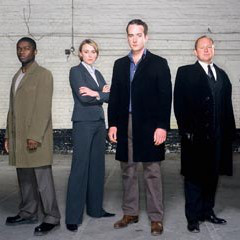
1. They lost the show creators and never quite found the experienced drama writing talent to replace them
The original series of Spooks (1-4) were penned by David Wollstoncroft and Howard Brenton (both experienced drama writers and playwrights and both interested in the grey area between Le Carre moral ambiguities and pacey contemporary stories) and saw ex MI5 and CIA operatives offer script advice early on (leading to bizarre yet powerful moments such as blow-drying a cat and having a girlfriend who doesn’t know your real identity). This meant that early Spooks, despite it’s episodic nature, had strong themes and character development for most of s1-4. Physical explosions were always off set by internal explosions in character’s heads and tough moral decisions which broke the proverbial camel’s back or made monsters of men and women. It’s no secret that the majority of fans see 2.5 and 4.10 as two of the best scripts ever penned on Spooks.
Once the duo left, the show hit rocky territory, either styling itself on 24 and American drama to the detriment of character, upping the patriotism factor and downplaying the internal and upping external danger or trying to implement overarching plot arcs with varying degrees of success and believability. Too often the show felt like bad spy and conservative government propaganda rather than the tough yet intellectual bent of early series which focussed on the moral war found within individuals when they tried to spy for Queen and country. This problem is most obvious in Series 9 and 10, when two inexperienced writers took over the show, willfully ignoring canon, the need for character development and generally making some dubious assumptions about why many fans watched the show (but more on this later).
2. They Lost Sight of Spooks Main Theme: The Human Cost to Being a Spy…
In my opinion, the strongest character arc on Spooks was Tom Quinn’s, whose internal character explosion was both heartbreaking and believable. Brenton and Wollstonecraft used shock factor deaths sparingly with Zoe being burnt after doing her duty as a honey trap and getting squeezed by an uncaring bureaucracy, Tessa being fired due to questionable decision making, Sam leaving the service devastated by Danny’s death and Ruth sacrificing herself to leave Harry top dog in 5.5. Once they lost Ruth however, it felt like the show lost its moral way, with first Zoe than Ruth representing humanity and the bleeding hearts club. From Series 5 on, the show often emphasized physical dangers to spy work over personal and moral dangers to the detriment of the show. Because we never got to see what the characters felt about the tough choices they often made, they could seem like automatons or people as bad as the terrorists they faced. Though the show would occasionally remember its original theme (like in the majority of the excellent Series 7 or parts of Series 8), the majority of the time it was assumed the audience would identify with characters because we were told again and again that our spies were heroes despite the questionable and sometimes downright horrendous decisions made. Once they lost moral compass, we were expected to identify with characters like Harry Pearce even when they did bad things.
3. They Became Victims of their own ‘Shock Factor’ Trademark
In 1.2, Lisa Faulkner faced death by deep fat fryer in a scene which is still shocking to re-watch today despite over a decade passing. Consequently, the audience knew pretty early on that Spooks was a show where nobody was safe and back then, because characters had been given strong back stories, we cared deeply when it happened and were genuinely shocked. Both Danny’s and Colin’s deaths were brutal and upsetting. As the series continued on, the shock factor became Spooks own worst enemy. It seemed like whenever the writers didn’t know what to do with a character or how to get rid of one, they’d kill them. The problem with this method was that it soon became boring and predictable, cutting off character arcs in medias res instead of allowing for genuine character arcs. It also made it increasingly difficult to care about new characters when they were entered and offed from the Grid with little character development or initial depth (see next point).
4. They Followed a Set Character Formula and Forgot How to Characterize
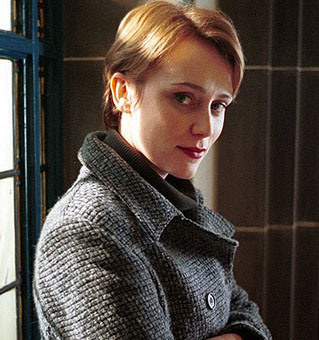
Zoe became…
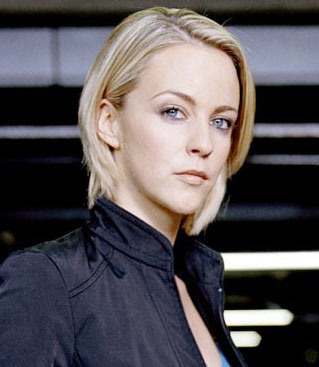
Jo became…
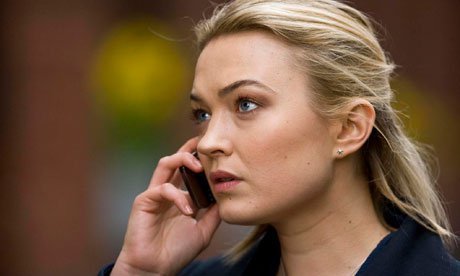
Beth with less and less character development each time…
The initial series was devised as an ensemble piece, held together by Tom Quinn, played by Matthew McFayden. This meant that all of the original team had character arcs and when they were eventually replaced, the new ones were given arcs too. Unfortunately, once Brenton and Wollstonecroft left, new cast members were treated like monikers for the old ones, given little character to work with (Eg Danny became Zaf became Ben became Tariq with less and less personal history given to each character with each new transition). It became more and more noticeable, culminating in the bland and blank slate team of Erin, Calum, Tariq amd Dimitri in Series 10. It is especially noticeable when you watch early series to series 5 and notice that some characters have more characterization in half an episode than a similar moniker character has in an entire series in the later series (eg Compare Zoe’s six series 1 episodes to Beth’s 8 Series 9 ones).
At the same time, a decision was made to invest more character arc and development time into certain kinds of characters: namely the white alpha male lead, the white female alpha lead (in her defense, Ros was awesome, but more on that next post) and to a lesser extent, Harry and later his will they/won’t they relationship with Ruth. The problem with this was that viewers were left with minimal emotional connection to characters and the show became less ensemble. It also meant that by the time of later Adam Carter and Lucas North we were treated to endless sex with poorly acted and developed girlfriends who had nothing to do with Spooks themes overall or were so abysmally awful (as in the case of Sarah Caulfield), they detracted from the story lines they featured in. It also meant that relationships between characters were largely abandoned to the detriment again of the original ensemble cast premise.
5. They Stopped Being the Grey Area Between Le Carre and Bond and Became 24Lite
Around the time of Series 5, a creative decision was made to make the episodes punchier and more action packed. Given what I’ve said already about use of character monikers and failure to develop characters in their own right at the same time as abandoning the original theme, you can guess why I thought this was a disastrous move. Once you take away developed characters to invest in and thematic cohesion, some viewers such as me were left clinging to old hand Spooks players such as Malcolm, Harry and Ruth to maintain interest. This made it all the more infuriating when certain creative decisions were made about such old hand characters.
6. They Wilfully Ignored Previous Canon and Resolving Story Arcs
Though to some extent, Spooks set up a very early precedent for ignoring canon and for resolving story arcs (hello Sam), it was easier to overlook because of strong themes and characters to care about. Once the show lost these things it became more and more infuriating when they ignored canon or established story arcs. From the inexplicable Juliet turned villain turn in Series 6, to the supposed traitor-hood of the Home Sec in Series 9 to the worst insult of all, the destruction of an until that point enormously interesting character in Lucas North, the cracks started to show more and more.
At the same time story arcs were abandoned at the drop of a hat. The Series 7 finale was never fully resolved, the consequences of Ruth’s return in 8.1 wasn’t picked up on until Series 9 causing some very inconsistent Ruth characterization in the transition from 8 to 9, Zaf is killed off screen after an entire series of dangling the carrot of his return and Harry escapes consequences again and again with little explanation of how he gets away with it. The worst case of canon disregard and story arc butchering came with…
7. …The Lucas North Debacle
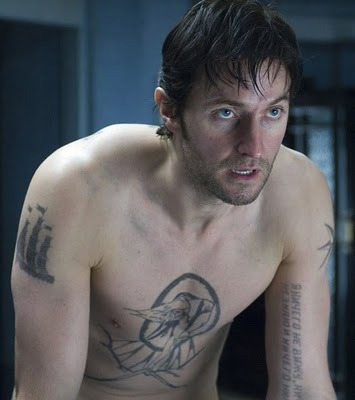
Show me the man or woman who genuinely can explain the Lucas North story line so that it makes sense and I’ll show them the live dinosaur I keep in my closet. Take a look on any Spooks fan forum, IMDB page, review site, blog, tumblr post or online newspaper commentary spot, and you’ll instantly see the amount of anger this story line caused. It wasn’t just anger because some were hardcore Richard Armitage fans who wanted their favourite actor to go out the hero. It was a number of fans, myself included, hopping mad that they’d had two series worth of canon ignored and butchered to make a shock ending to Series 9 that had nothing to do with the cost of being a spy, rendered Lucas’ actions in previous series incomprehensible and simply served to ensure that the story arc about Harry, Russian prison and loyalty never had to be dealt with to maintain Harry as The Writer’s Hero TM.
Much has been said about this character hatchet job through the creation of the Lucas North alter ego John Bateman. Suffice it to say, the debacle burnt a lot of fan loyalty going into series 10 and wasted time which should have been spent on building up a new ensemble team (in particular Beth, Tariq and Dimitri). My favourite quote by far on the Lucas North mess came from The Guardian’s Vicky Frost whose hilarious viewing commentaries were sometimes superior to the show she viewed. Her response to wet blanket girlfriend Maya’s comment to notLucas! who inanely stated “Do you know how I knew it was true? Because for the first time you made sense” was comedic gold. “That’s bloody optimistic, Maya. Lucas makes less sense than ever before,” was a sentiment shared by many at the time and the Lucas debacle remains one of the worst plot decisions I’ve seen on any TV show ever.
8. They Assumed Harry Pearce was the Moral Compass and Beating Heart of the Show…
I’ve alluded to this one already. I used to quite like Harry, but by Series 8, I would have been quite happy to see him shot in the back of that boot by a faceless terrorist. The problem with Harry wasn’t that he was a flawed character (which is always interesting), but that he was a flawed character sold by the writers as the moral arbiter and hero of the show. We were banged on the head again and again with such sentiments and Harry was never given consequences for the poor choices or immoral decisions he made because he became a serious case of the ‘privileged white male hero who can do no wrong’ trope. Anyone who showed up Harry had to go. Any story line that undermined Harry as supposed paragon of goodness had to go (see Lucas North). It was both immensely frustrating and morally questionable for this viewer. Though many saw Harry as the beating heart of the show (and that’s fine), just as many did not…
9. … And in Doing so Lost the Show’s Real Moral Compass
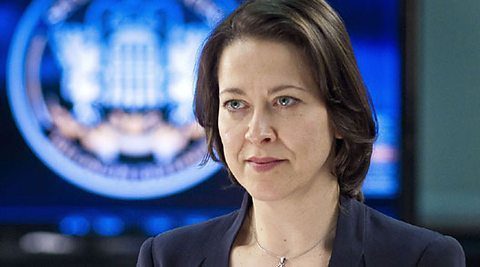
When Keeley Hawes left the show in Series 3, Nicola Walker had to take on a greater role in episodes to fill the moral gap left by Zoe leaving. Full of heart, compassion, kindness and humanity from early on, many saw Ruth Evershed as the show’s moral compass alongside Harry. I know of many casual viewers who stopped watching once Ruth left because they felt that the show no longer had heart. Such was Ruth’s popularity amongst viewers, she returned to the Grid in Series 8 till the show’s end, resuming her on/off relationship with Harry at the same time as burning up inside with guilt over 8.1. With other characters given little to work with, the Ruth/Harry relationship was given greater prominence and by Series 10 was given increased weight. At the same time, Nicola was given more to work with in developing the Ruth character. When reviewers reviewed Series 10, many pointed out that Peter Firth and Nicola Walker carried the show, with some pointing out that Nicola deserved kudos for essentially stealing the show’s battered crown out from under other flashier characters noses, her performance a masterclass in quiet dowdiness, intelligence, social paralysis and heart.
Her death felt un-necessary, cheap and needlessly cruel after three series of largely unnecessary ‘ship teasing’ without developing other characters or credible story lines for viewers to invest in. Not only did her death in the final few minutes of Spooks feel mean spirited, it didn’t further the theme of the cost of being a spy (she died because of Harry’s personal history with the Gavrik’s rather than dying to protect Queen and country) and her death was penned in the laziest of ways. She was fridged to uphold Harry as the show’s moral compass and to deliver a final ‘shock’ to the audience and it still fills me with rage every time I remember the finale. In a recent interview, Peter Firth expressed his belief that the producers now regretted their decision to kill Ruth off. I doubt it, but I do know that they upset a lot of long term viewers in the way they chose to off her.
10. They Created a Finale Which Contained Many of the Above Excesses, but Ironically Tied up Little Thematically
As I stated earlier, I always saw the main theme of Spooks to be the human cost to being a spy: the moral, emotional and ethical costs. Instead, as another blog writer pointed out, the show tried to claim that Harry Pearce had always been the centre of the show. The final shot was intended to make us feel safe with Harry behind the desk protecting us despite it all. Given the continued poor judgement he made during Series 9 and 10 in particular, I was left cold and confused. I didn’t want a Harry protecting me: I didn’t want a broken shell of a man protecting me with a stiff upper lip and ice in the heart. I wanted a welcome dose of humanity that never came. Maybe the film will oblige?


April 23, 2015
Flash Fiction: The Hestia
This piece was originally published last year as part of IfBook Australia’s Open Changes project, but I thought my blog readers might enjoy reading my brief crime piece here.
The Hestia
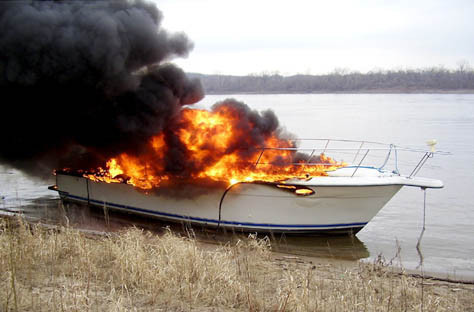
My hips wedge against the boat rim. I can taste the roughness of knotted rope at my mouth. Thick braids constrict my hands, feet, waist. With the movement of the boat, I roll into cracked and peeling painted edges.
The Hestia.
I had defined myself by him and me: Paul and grey stone pylons, pebbled sand underfoot, waves crashing, shoreline to shoreline. Back then, I imagined that our love would run free, our feet taking wing. Like Jesus we���d walk on water into sunset, coming out the other side, unscathed���
���Hestia, Hestia,��� he said early in.
���Not Hestia. Ruthie, remember?���
Too dark. Too reticent to be flaming Hestia.
He stroked my cheek.���My island worshipping Hestia, darling.��� His eyes burn smoke rings on my retinas as he flings liquid all over.���Sacred heart, sacred flame, burn bright for me.���
The boat lulls gentle on cresting tips. He hasn���t shared salt spray or the scaly damp of silver fishies. Rainbows reflect in slick oil.
He drops the match, leaps ashore and pushes the crackling boat into deeper sea.
Blistering skin. Obscured by smoke and flame.
Behind me, the pylons and Paul���s mad shadow. Ahead, the promise of blurry sunset.


April 20, 2015
Doctor Who Re-watch: The Caretaker Review
Disclaimer: In 2013 I reviewed the second half of Series 7 for The Hairy Housewife and fully intended to do the same for Series 8 last year. Unfortunately, it proved impossible. Life and work and caring responsibilities called and at my lowest point, I was about five episodes behind everyone else. After speaking recently with Gemma, she thought it would be cool for me to do a re-tread of Series 8 to tide blog readers over until Series 9 airs. So that���s what���s happening. Every week I���ll re-watch and review an episode for this blog. Feel free to join me! Oh, and there will be spoilers.
The Caretaker reminded me an awful lot of Chris Chibnell’s The Power of Three. In many respects it achieves the same thing that that episode did with Amy and Rory’s relationship with Eleven explored in that episode just as Clara and Twelve’s is in The Caretaker. The difference is that Danny is an outsider whereas Rory is a companion at that point in Series 7. The Caretaker also features one of the common threads of Moffat era Who: interesting thematic ideas and character development with a lousy alien of the week. The alien is a vehicle for character exploration. Nothing more.
The Caretaker sees Twelve go undercover at Clara’s school to face down an alien force. Comedy ensues as The Doctor antagonises Danny and his relationship with Clara, trolls Clara trying to teach, is a bad influence on the children and generally makes a fool of himself. There are also some nice shout out moments to previous episodes with The Doctor referencing his relationship with River, a re-visit of the John Smith pseudonym, a police officer death similar to The Eleventh Hour, an Eleventh Doctor reference and the return of unimaginative and irritating children (Clara’s earlier charges in series 7 I’m looking at you).

Companions who Never Were
There’s a pattern here, Series 8. Young Courtney fills the role this week, though her response to the TARDIS (vomiting and running away) leaves a lot to be desired. I can’t help but feel that her staying far away from the TARDIS is a good thing.
Dan the Soldier Man
One of the strongest points of Series 8 has been its willingness to follow a theme through to the end and give character’s space to develop. The Doctor’s hatred of soldiers continues in The Caretaker. This time The Doctor equates sport (PE teachers) with soldiers as he puts Danny down again and again.
Doctor: Some military idiot will attack it… the world is full of PE teachers.
Clara protests: He’s a maths teacher. Not a soldier.
The Doctor: Interesting.
It is implied later in the episode that The Doctor is testing Danny as a person and Clara’s ability to choose a partner well. In one of the more interesting ideas of the episode, Danny tells The Doctor that he is the officer who lights the flame which draws soldiers into conflicts. Death In Heaven follows this through so more on this theme later.
The Danny and Clara Relationship
I didn’t actually like Danny as a character until Dark Water. Samuel Anderson feels a bit too forced to me and his character was no Rory. It didn’t help that he was inconsistently written. One second he was a second Rory, the next he was a controlling tosser. Like Amy, Clara cannot admit to her lover that she leads a double life (despite the lessons of Listen). Unlike Amy, she tries to have her cake and eat it too by living both lives at once. Understandably Danny is upset, but that doesn’t make it OK when he says the below:
Danny: Do you love him?
Clara: No, not in that way.
Danny: What other way is there?
Wow Danny? Have you never heard of a little thing called friendship. Douche. Admittedly The Doctor is no better when he says:
You’ve explained me to him [Danny]. You haven’t explained him to me.
Why on earth does Clara need to justify herself to either of them? She is a grown woman who can make her own decisions and choices. This is one of the few Moffat era Who episodes which I genuinely feel is sexist. On the plus side, Danny rushes in to protect Clara from evil aliens. Unfortunately, unlike Rory, he doesn’t do it because he genuinely loves Clara and wants to understand her choices. He does it to prove himself worthy to the person he perceives controls Clara ie The Doctor. I genuinely wanted to throw something at the screen when he said the following:
Danny: I was behind you every step of the way… I had to know you were safe. I had to be good enough for you… that’s why he’s angry. Just in case I’m not.
Everything about this plot thread annoyed me and I’m glad they abandoned it down the track.
Understanding Twelve
Twelve continues his trend of failing to differentiate between human faces, getting confused by Clara’s appearance and expressions and assuming that Clara’s lover is an Eleventh Doctor look-a-like teacher down to the bow tie. His habit of putting down others continues to jar. However, this episode reveals more of the true Twelve, the one fully developed by the series finale, the one who is simply an old man with a box travelling and learning.
Though I don’t much enjoy the child actors they get on New Who, I did enjoy Twelve’s exchange with Courtney:
Courtney: I’m a disruptive influence!
The Doctor: Pleased to meet you.
Here, The Doctor’s cluelessness is endearing.
As is his banter with Clara (also Clara the teacher is much more interesting than Clara the walking plot device). I love it when he leans into the classroom and argues about literature, when he winks at her upon being announced as the new caretaker, when he says ‘sing Hosanna’ at Clara doing what she’s told for once and when he equates acting like an idiot with the care-taking job. I also like Clara’s quip to The Doctor and reminder to the audience that she is The Doctor’s teacher as much as her students teacher.
Clara’s Addiction
Like The Power of Three, this episode highlights what happens to companions when they grow addicted to running with The Doctor. The opening of The Caretaker sees Clara exhausting herself managing two lives at once. Something has to give and that thing is her relationship with Danny. She even gives up a night of ‘canoodling’ to run with The Doctor.
She has ‘learnt’ The Doctor’s role, this time telling Danny the TARDIS story herself (as he looks inside to Amy’s Theme). The show continue to show us how she has adopted the role as the series progresses. However,Danny warns her (and us) about the dangers of finding running with people like The Doctor normal.
Danny: They make you stronger, do things you never thought you could do. You weren’t scared. You should have been.
It will be interesting to see how Moffat et.al. develop this in Series 9.
A Glimpse of Heaven
We get another reminder of Missy this week and get our first glimpse of the officious Seb to some great work from Murray Gold as we hear the first proper run of Missy’s Theme. We also get a better look at The Neversphere/Promised Land. When Seb says ‘So… any questions?’ It’s a deliberate meta question to the fans who have so many.
The Caretaker: 6/10 inky stars


April 12, 2015
And the winners are…
What a great time I had at the 2015 Aurealis Awards. Such talent we have in Australia!
 Originally posted on Aurealis Awards:
Originally posted on Aurealis Awards:
Congratulations to all the winners awarded at the glitzy ceremony in Canberra last night. It was a wonderful event, organised by Awards convenor extraordinaire Nicole Murphy and hosted by the amazing Margo Lanagan. While we announced the results on Twitter and Facebook as it happened, for posterity, the winners of the 2014 Aurealis Awards are:
BEST FANTASY NOVEL
Fireborn, Keri Arthur (Hachette Australia)
This Shattered World, Amie Kaufman and Meagan Spooner (Allen & Unwin)
The Lascar’s Dagger, Glenda Larke (Hachette Australia)
Dreamer’s Pool, Juliet Marillier (Pan Macmillan Australia) – WINNER
Afterworlds, Scott Westerfeld (Penguin Books Australia)
Daughters of the Storm, Kim Wilkins (Harlequin Enterprises Australia)
BEST FANTASY SHORT STORY
“The Oud”, Thoraiya Dyer (Long Hidden, Crossed Genres Publications)
“Teratogen”, Deb Kalin (Cemetery Dance, #71, May 2014)
“The Ghost of Hephaestus”, Charlotte Nash (Phantazein, FableCroft Publications)
“St Dymphna’s School…
View original 647 more words


And the winners are���
What a great time I had at the 2015 Aurealis Awards. Such talent we have in Australia!
 Originally posted on Aurealis Awards:
Originally posted on Aurealis Awards:
Congratulations to all the winners awarded at the glitzy ceremony in Canberra last night. It was a wonderful event, organised by Awards convenor extraordinaire Nicole Murphy and hosted by the amazing Margo Lanagan. While we announced the results on Twitter and Facebook as it happened, for posterity, the winners of the 2014 Aurealis Awards are:
BEST FANTASY NOVEL
Fireborn, Keri Arthur (Hachette Australia)
This Shattered World, Amie Kaufman and Meagan Spooner (Allen & Unwin)
The Lascar���s Dagger, Glenda Larke (Hachette Australia)
Dreamer���s Pool, Juliet Marillier (Pan Macmillan Australia) ��� WINNER
Afterworlds, Scott Westerfeld (Penguin Books Australia)
Daughters of the Storm, Kim Wilkins (Harlequin Enterprises Australia)
BEST FANTASY SHORT STORY
���The Oud���, Thoraiya Dyer (Long Hidden, Crossed Genres Publications)
���Teratogen���, Deb Kalin (Cemetery Dance, #71, May 2014)
���The Ghost of Hephaestus���, Charlotte Nash (Phantazein, FableCroft Publications)
���St Dymphna���s School���
View original 647 more words


April 9, 2015
Getting Lost in Translation: An Interview with Stephanie Smee
And now for something completely different on the old blog… My brother has a passion for all things linguistics so I am very excited to be able to host an interview with a translator at the InkAshlings blog. Stephanie is currently working as part of the Eagle Books team on translating a Jules Verne adventure novel into English. I interviewed Eagle Books founder and author, Sophie Masson, in March. You can read my interview with Sophie here.
1. Tell us a bit about your background and how you got into translating books.
I came to translating via a career in the legal world. I read both Law and Arts at Adelaide University, majoring in French language and literature. I then completed an Honours year in French at Sydney University. Languages have always been my first love, I think; I have polyglot parents ��� a Swedish mother who speaks 5 languages and an Australian father who also speaks 5 languages (although two of his are no longer really ���spoken���, ie Latin and Ancient Greek.) It���s probably fair to say I inherited a love of words ��� in many languages: French, German, Italian, Swedish -from them both!
After practising as a solicitor in Sydney and London, I made a decision to go back to my love of French and sought my NAATI qualifications in translation. It took me a while to launch myself into the wonderful world of literary translating after spending a number of years working as a legal translator.
It was a conversation with my brother, an art critic, that prompted me to take the leap from law to literature. That, and the never-ending support of my husband who encouraged me to focus on my first project, the translation into English of the Countess de S��gur���s iconic French children���s books. I have also been extremely fortunate to have wonderful friends and mentors: Cheryl Akle, director of Better Reading, who introduced me to Lou Johnson at Simon & Schuster, publishers of my translations of the Countess���s beautiful books; and Sophie Masson, author and one of the directors of Christmas Press and Eagle Books.
2. What has been the most exciting part of translating a Jules Verne novel?
It is an enormous privilege to be part of this exciting publishing event. It���s not every day one gets to translate a Jules Verne novel!
While Mikhail has been, and continues to be, enormously popular in France, it is almost entirely unknown to Anglophones. So, perhaps one of the most exciting parts of the project is knowing that I am part of the team bringing this wonderful historical adventure story to a whole new English-speaking audience.
Jules Verne is a masterful story-teller, and I feel very privileged to be helping to continue his legacy. And what a legacy it is!
3. What has been the most challenging part?
The challenges involved in translating such a novel are numerous, but they are part of the fun! Verne is the master of creating a very immediate sense of place, even if that place is a village in the heart of Siberia. Part of his technique involves the extraordinary degree of detail with which he paints his scenes ��� one can almost see the lightning cracking over the Urals in the middle of a thunderstorm, feel the bumpy road as the wooden telega wends its way through the mountain pass. His vocabulary is enormously rich and I often find myself delving into my wonderful 19th century dictionaries and poring over old maps of the Russian Empire given to me by my father-in-law for just the purpose of confirming place names and geography. Yet Verne���s dialogue is sharp and fresh. It scarcely feels like any work is needed to render it into engaging English for a 21st century reader!
4. Is there anything that simply won���t translate into English and how do you get around that?
Linguistically, challenges often arise when translating humour and wordplays, but working on such sentences can be the most entertaining and gratifying for a translator. There have certainly been some concepts and even sentence structures favoured in the 19th century that have had me sitting back on my haunches while I determine the best way to render them for our new readership. Hopefully I have been successful in my endeavours in this regard!
5. What���s next for you and Eagle Books?
I am very much focussed on this exciting launch title for Eagle Books, but I hope it is the first of many wonderful collaborations.
Thanks Stephanie for your insights into an unusual, but different, fun and rewarding career. Please do consider backing Stephanie’s project here.
You can like the facebook page for Eagle Books here and the Eagle Press website here. I will be interviewing others involved with this project in coming weeks so stay tuned…
About Stephanie…
Stephanie is a translator into English of all things literary and French. Having worked as a lawyer in Sydney and London, Stephanie happily traded in a legal career for a return to her linguistic calling. After several years as a legal translator, she left the world of pleadings and contractual documents behind and made her literary translation d��but with a new English translation of 19th century French children���s author, the Countess de S��gur���s Fleurville Trilogy published by Simon & Schuster (Australia) in 2010. The Trilogy includes the perennially popular Sophie���s Misfortunes, Camille and Madeleine: A Tale of Two Perfect Little Girls and The Holidays. Stephanie���s subsequent translations of the Countess��� works – also published by Simon & Schuster (Australia) – include the wonderfully cheeky Monsieur Cadichon: Memoirs of a Donkey (2011) and A Room at Guardian Angel Inn (2012) and its sequel, General Dourakine (2013). Her original short story, The Right Path, was published in Once Upon A Christmas (Christmas Press, 2014). Stephanie lives in Sydney with her family. Her website is at www.stephaniesmee.com


April 2, 2015
Doctor Who Re-Watch: Time Heist Review
Disclaimer: In 2013 I reviewed the second half of Series 7 for The Hairy Housewife and fully intended to do the same for Series 8 last year. Unfortunately, it proved impossible. Life and work and caring responsibilities called and at my lowest point, I was about five episodes behind everyone else. After speaking recently with Gemma, she thought it would be cool for me to do a re-tread of Series 8 to tide blog readers over until Series 9 airs. So that���s what���s happening. Every week I���ll re-watch and review an episode for this blog. Feel free to join me! Oh, and there will be spoilers.
I was so excited for this episode the first time round because KEELEY HAWES Y’ALL. Ahem. Anyway, who knew that an episode penned by Stephen Thompson (he who also wrote orientalist Sherlock episode and the abysmal The Curse of the Black Spot) could be such rollicking fun and still smart at the same time? This episode is what happens when Oceans Eleven meets Doctor Who and the story could have worked as past of the Series 7 run, when each week caricatured a new genre. Time Heist sees The Doctor and Clara positioned alongside two other strangers to rob the most secure bank in the galaxy. Only problem is, neither of them can remember why they agreed to rob the bank or who the mysterious Architect is who directs them on their mission.
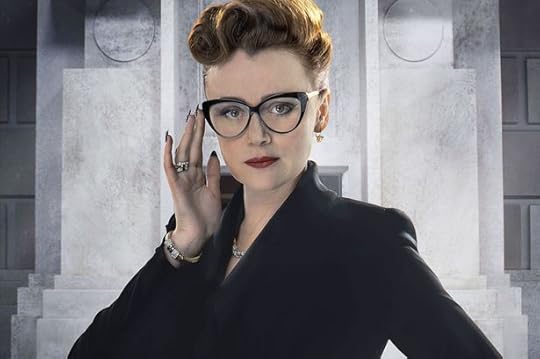
Companions who never are?
Luckily, beyond the opening credits, this stand alone episode really kicks off as we meet Psy (zomg Ollie from Broadchurch) and Saibra (The Doctor and Clara’s partners in crime) as well as see the impenetrable bank, with a set and costumes reminiscent of The Hunger Games (yay for high production values!) Both Psy and Saibra are interesting would be companions, adding to the long list found in Series 8 as a whole. Psy can delete memories and did so in prison to protect his loved ones. Saibra can shape change. Both die in blazes of glory with Saibra telling The Doctor, ‘You’re a good man. I left it rather late to meet one of those.’ Psy goes out the tragic hero.
But this is a Moffat overseen episode, which means people don’t stay dead and everybody lives if The Doctor comes to call. Though some may have found this a bit of a cop-out, I enjoyed the scene in the TARDIS at the end as Clara, The Doctor, Saibra and Psy enjoyed some TARDIS take-out. One of the (many) things I like better about Moffat’s run, is that we see The TARDIS as both a home and a friend.
The Clara/Danny/Doctor relationship
The second time watching, the episode opener with Clara and Danny tackling their second date moved me much more than it initially did, even if Danny’s acting is still slightly off and The Doctor’s continued criticism of Clara’s appearance continues to irk. More interesting than The Doctor’s insistence on insulting Clara’s appearance, was Psy’s conversation with Clara where he says that The Doctor calls himself The Doctor because he goes in for professional detachment with Clara transparent about travelling with him for so long because she has learnt to keep making excuses.
Revealing Twelve
This episode is predominantly fun filler with a tough edge, but we do learn more about Twelve. We learn that this Doctor sees him being in charge as ‘his special power’ and that his idea of a plan is to say what the heck and hope ‘that a thing happens’ (How very Eleven of you, Twelve). Finally, he reminds Karabraxos and the audience that he has been around a long time and is still wearing in a new face as he says of his regeneration, ‘I was hoping for minimalism, but I think I came out with magician.’
The Villainess
Keeley’s entrance as Ms Delphox didn’t disappoint, even if she did continue the trend of female villains on Doctor Who being tall, angular and wearers of bright red lippie. Ms Delphox is an interesting character: a creepily seductive villainess, who nonetheless becomes sympathetic towards the end of the episode when you realize that she is only doing her job. Though The Teller’s detection of another man’s guilt is horrifying as his brain is turned to soup, we can see both sides to the story. Ms Delphox is cruel to people with criminal intent, but she is protecting the bank’s reputation and security rating at the same time. The message is clear. If you obey the rules at the bank, there will be no moral or physical consequence. Alas for The Doctor and his companions…
Keeley had a challenging part: having to play both the clone, Ms Delphox, as well as the real puppeteer behind the bank, Karabraxos, a bitter, rich woman who doesn’t care about people unless they get her more tangible things to add to her wealthy collection. We see this in her private room, a den of antiquity and collector’s items complete with classical music playing in the background. Keeley is a revelation, playing both parts with ease and still bringing a dash of humor to the role.
Karabraxos doesn’t understand The Doctor and his companions at all. ‘What is this display, as amusing as you are?’ she says in response to The Doctor weaponless. At last he realizes his own clever deception for the woman who called The TARDIS was Karabraxos herself, old and infirm and choked up on regrets. He tells her humorously, ‘I thought we were getting on,’ as he gives the young and surprised Karabraxos his number, followed by ‘You’ll be old and full of regret for the things you can’t change.’ Helping an awful woman undo regrets and rescue an ancient species – is this not the summation and the essence of The Doctor? I like to think so.
Time Heist: 9/10 inky stars

March 24, 2015
Looking for Creative Opportunity: An Interview with Sophie Masson
Many people know Sophie as the writer of a number of popular of books across many different genres and age ranges. Some may know of the work she does to support emerging writers through writers centre programs and roles with national writers bodies such as the ASA. However, many are unfamiliar with her latest business adventure – one of the directors and brains behind two new small presses – so I asked Sophie to answer some questions for the blog to fill us all in!
1. Tell us a bit about Christmas Press and its imprint Eagle books.
Christmas Press is a small children’s publisher, a partnership business between four creators: myself; illustrator and designer David Allan; author and illustrator Fiona McDonald; and writer and editor Beattie Alvarez. We started in 2013 and to date(March 2015) have published 4 books – three picture books featuring retellings of traditional tales – fairy tales, folk tales, myths and legends by well-known authors(to date, Ursula Dubosarsky, Kate Forsyth, and myself, with more to come this year) and lavishly illustrated by emerging illustrators – in this case, David and Fiona (though more illustrators will come on board next year). We have also published a Christmas anthology, Once Upon A Christmas, with poems, stories and illustrations by lots of different authors and illustrators.
Christmas Press itself will continue to concentrate on those sorts of books but we have just started a new fiction imprint for young people, Eagle Books, which will concentrate specifically on adventure fiction. And very excitingly our launch title is the first new English translation in over a hundred years of the great Jules Verne classic, Mikhail Strogoff, which will be translated by Stephanie Smee, whose previous translations of the great classics by the Countess de Segur have been bestsellers.
2. What made you interested in setting up a small press?
We felt there was a gap in the market–and that there WAS a market for retellings of traditional stories, the kinds of books we weren’t seeing around but that we’d all grown up on, loved, and been inspired by. And then as Christmas Press developed, we felt there was also an opening for the kinds of very adventure-focussed fiction that Eagle Books will focus on.
3. What is your long-term vision for each imprint?
Christmas Press will very much concentrate on those twin elements: beautiful picture book retellings of traditional stories, and one Christmas-themed title a year. We may also consider other possibilities in the future, such as standalone picture books or reprints of out of print books. But that’s for later. With Eagle Books, we’ll be concentrating on adventure fiction: whether set in historical, contemporary or fantasy backgrounds, and with a mix of classic and modern authors. We feel it’s important for a small press to not try to do too much and go haring off in all directions. So our lists are very focussed.
4. What is your top learning from starting your own small business?
Do your homework regarding sales possibilities, pitching to distributors etc: very important you get that right!
5. What opportunities are there for people to:
a) get involved?
Have a look at our books, check out our websites and Facebook pages and let us know what you think!
b) support your press?
Right now, it would be great if people might have a look at our crowdfunding campaign for Mikhail Strognoff and consider contributing to and/or publicising this fantastic project.
Thanks Sophie for some great insight into your latest projects! Please do consider backing Sophie’s project here. You can like the facebook page for Eagle Books here and for Christmas Press here. You can find the Eagle Press website here and the Christmas Press website here. I will be interviewing others involved with this project in coming weeks so stay tuned…
About Sophie:
Born in Indonesia of French parents, and brought up in Australia and France, Sophie Masson is the award-winning and internationally-published author of over 60 books for children, young adults and adults, published in Australia and many other countries. Among these are her bestselling historical novel for children, The Hunt for Ned Kelly (Scholastic Australia), which won the Patricia Wrightson Prize for Children’s Literature in the 2011 NSW Premier’s Literary Awards. She has also written four popular YA romantic thrillers under the name of Isabelle Merlin. Under the name of Jenna Austen, she has also published two romantic comedies for tweens and early teens.
2014 was a big year for Sophie, with several novels for young people published: The Crystal Heart(Random House Australia), 1914((Scholastic Australia) and Emilio(Allen and Unwin). Her latest adult novel, Trinity: The Koldun Code, first in the Trinity thriller series set in Russia, was published by Momentum Books in 2014, and her non-fiction adult title, The Adaptable Author: Coping with Change in the Digital Age , featuring interviews with over 40 authors, agents and publishers on the state of authorship and the publishing industry today, was published by Keesing Press in the same year. Forthcoming in 2015 are Hunter’s Moon (Random House Australia, June 2015) and Trinity: The False Prince (Momentum, October 2015).
Sophie is also one of the founding partners in a new children’s publishing house, Christmas Press. Sophie has served on the Literature Board of the Australia Council and the Book Industry Collaborative Council. She is still on the Board of the Australian Society of Authors, where she is an Executive Member, on the Board of the New England Writers’ Centre, where she is Chair, and she is President of the New England and North West sub-branch of the Children’s Book Council of NSW. In 2014 she was on a Peer Panel for the Australia Council, in the Literature division, assessing publishing grant applications.
You can follow Sophie’s blog or read her website


